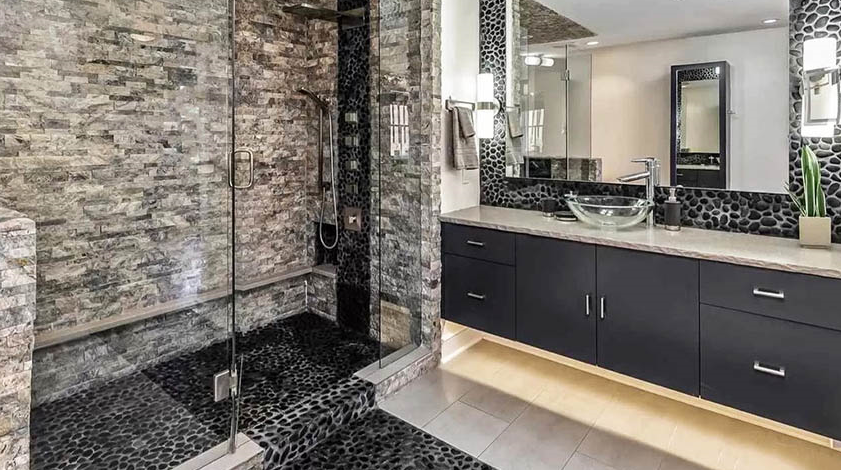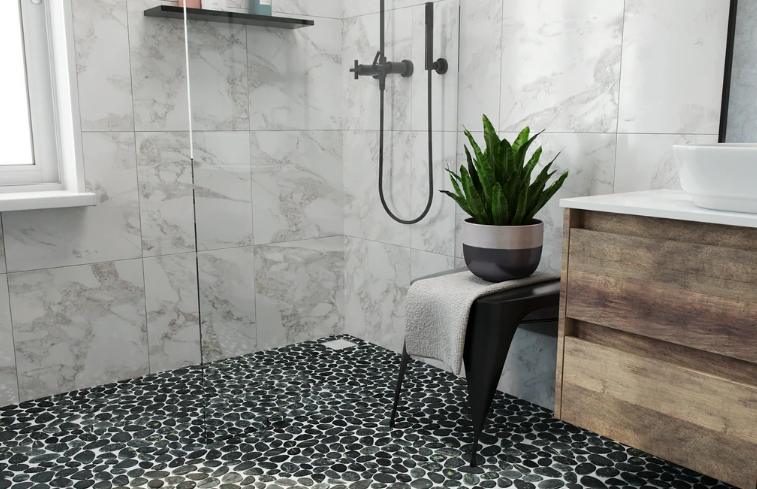As you know, walking on small stones relaxes a little. If you combine the effect with a jet of water that runs between the pebbles, you get a beautiful effect in the bathroom. More about pebble shower floor pros and cons you can find in this article.
You may also be interested in : pros and cons of quartz shower walls
Advantages of a pebble shower floor
Quite often, people wonder what are the pebble shower floor’s pros and cons. The main benefits of the pebble shower floors we discuss in more detail below.
Availability of the pebble shower flooring. Ease of installation
To lay a pebble shower floor in the shower, you need quite affordable materials. It is necessary to prepare a sealant, mortar, and the pebbles themselves. You also require some tools to get the job done.
To save money, you cannot order the main material, but collect it on the shore of the reservoir.
On average, for each square meter of pebbles, you have to pay $4-8.
Everyone can install a pebble shower floor, even a person without experience. The most time-consuming step is laying out stones around the entire perimeter of the shower. Even in a day, it is possible to lay beautiful pebble tiles.
Scratch resistance of the shower floors. Anti-slip surface of pebble flooring
It is important to note that this floor option is very practical. It does not wear out and does not get scratched. Even if something heavy falls on the surface, only a few stones are damaged. Therefore, it is possible to carry out minor repairs in just a few minutes.
Given that the bathroom has high levels of humidity, and water is often spilled, it is not uncommon for people to fall and get injured.
If you lay out the shower floor of pebbles, such phenomena are excluded.
Pebble shower floors are slip-resistant. This is because a pebble stone floor has different shapes and sizes of tiles. If they are properly rooted in the ground, then injuries are excluded.
There must be mortar and sealant between the natural stone flooring. This is the only way to increase grip.
The pebble shower floors exclude the possibility of slipping. If you move around the bathroom in rubber shoes, you do not fall.
Walking comfort
If you want to walk on the shower floor comfortably, it is recommended to choose pebble tiles of a rounded shape and large size. Thanks to this, a massage effect is observed every time.
Big variety
As you know, there are different options for pebble flooring. Pebbles can differ not only in size and shade but also in patterns.
You can also stack several options at different distances. It all depends on your preferences.
Attractive appearance
If you have walked along the coast of the sea or the river, you have noticed that the stones are quite attractive. If you use pebble tiles for arranging a bathroom, the effect of walking along the shore of a reservoir is created.
There is a choice of different materials, as well as schemes for their installation. Use your imagination to create a unique design for the pebble shower floors.
Cons of a pebble floor
As you can see, the pebble shower floor has many advantages. However, one should not forget about the cons of pebble floors.
Availability of special skills for installation and maintenance
Before you start laying the pebble shower floor, you need to call a plumber. The master appreciates the quality of the floor in the bathroom. This prevents a variety of leaks because water still seeps through the stones.
You should also remember that you need to properly prepare the solution for shower trays. This is not always an easy process, so you have to study the information a bit.
The fragility of the pebble flooring
Caring for a pebble floor is quite difficult. After all, the mortar and sealant must be maintained in good condition. Given that the pebble shower floor is not level, there may be a loss of grout and sealant. Especially if you clean the floor regularly.
Application of a large volume of solution
To lay a pebble floor, you need a lot of mortar. It fills all the space between stones and tiles. Given that the bathroom requires hundreds of small stones, the solution requires several tens of liters.
On average, for a pebble shower floor, you need to prepare 2-3 times more mortar than for other varieties of the bathroom floor. To save on mortar, it is recommended to choose large stones.
Using the only high-quality service for pebble floors
When cleaning the shower floor, you have to work carefully. After all, you cannot damage the mortar and sealant. Frequent repairs are required as needed.
You may require maintenance at intervals of several weeks, according to reviews. You can clean the floor only after the floor is dry.
Slip-on bad texture. Discomfort when walking barefoot
In the bathroom, for safety reasons, it is recommended to make a rough floor. Small gaps should be left between the pebbles.
If the laying is dense, or if you fill in a lot of mortar, irregularities are excluded.
Because of this, the shower floors can become traumatic because you constantly slide on them. Especially if water gets on the bathroom floor.
Corrugated pebble shower floors create a massage effect. Many people like it. If you are not one of the massage lovers, try to walk around the bathroom in your shoes.
If this is not done, there is a high probability of injuring the legs. Pebble tile floors may have sharp edges that can cause cuts.
River rock shower floors can retain moisture
The use of pebbles from the river bank can cause mold to form. Rough edges cause water retention between the pebbles. If water stays in one place for a long time, it provokes the formation of fungus and mold. You can determine its presence by the musty smell in the shower.
Stones that are collected on the banks of the river can retain moisture longer. That is why they need more time to dry.
For additional protection, high-quality sealing is required.
To solve the problem, it is recommended to wash and dry the pebble flooring after each shower. Also, the laying of the river rock shower floor should be carried out at a steep slope so that the bathroom is well-ventilated.
Not the best option for hard water
If your area is dominated by hard water, you need to thoroughly clean and care for your pebble tile flooring. You can preserve the appearance of the tile floor only in this way. This can be explained by the fact that hard water can form a thin film of lime on the surface.
Pebble shower floor installation features
You need to inspect the shower floor first. This allows you to understand if the pebble is suitable for it.
The floor in the bathroom should be thick and not let in moisture. It must have a steep slope. It is allowed to lay a pebble shower floor only based on such conditions.
Once you decide everything, proceed with the installation according to the following instructions:
- Prepare and clean the floor. It is appropriate to make a few dents in it so that the base for the pebbles is better.
- Apply glue to the surface. The thickness should be 1/8 inch. You need to work with the help of a trowel and move from the far wall to the exit.
- Lay the pebbles following the same path. Make sure they stick together.
- The space left between the stones must be filled. To do this, you need to use smaller and thinner pebbles. Wait a day for the coating to dry.
- Apply some sealant. It should equally cover all parts. After, you need to wait for it to solidify. The sealant should fill not only the space between the pebbles but also the stones themselves.
After the sealant dries, mix the solution with water to form a thick consistency. It must be evenly applied to the shower floor to completely cover the pebbles. Remember to apply the mixture to the space between the stones.
Then you have to wait half an hour. Next, proceed to remove the excess grout. It is best to do this with a damp cloth.
Wait about a day until the grout completely hardens. After the specified time, you need to apply another layer of sealant, and then again wait a day. Once 24 hours have passed, the pebble shower flooring is serviceable. Constantly look after it so that in a few months you do not have to do repairs from scratch.
FAQ
Considering that pebble stone flooring is not yet so popular today, people who want to install it face a variety of questions. Detailed answers about pebble shower floor pros and cons we have considered, there are only a couple of questions left.
Is a pebble shower floor hard to clean?
Floor cleaning is not as difficult as it might seem at first glance. It is necessary to prepare an acetic solution. To do this, 1 part of white vinegar is mixed with 16 parts of water. The agent is sprayed onto the pebble floor, after which it is cleaned with a brush.
It is recommended to use a brush with nylon bristles. The movements must be circular. After the product should be washed off with warm water.
Do pebble shower floors need sealing?
Pebbles must be sealed with a high-quality sealant. At the same time, work is carried out both before and after grouting.
You can buy high-quality sealant at the nearest hardware store.
Are stones good for the shower floor?
Pebble tiles would not be the best option for a shower floor. Firstly, it is quite stackable. This is because it has poor tenacity. After all, it has an uneven shape. This significantly complicates installation and maintenance.
Conclusion
As you can see, pebble shower floors have numerous pros and cons. That is why it is up to you whether to install them or not. If you are not embarrassed by the complexity of installation and the need for frequent maintenance, feel free to lay a pebble floor.
How long does a pebble shower floor last?
The longevity of a pebble shower floor will depend on several factors, including the quality of the materials used, the installation process, and the level of maintenance. A properly installed and well-maintained pebble shower floor can last for many years.
What is the most durable material for a shower?
Porcelain and ceramic are considered to be the most durable materials for a shower. They are resistant to moisture and mildew, and are easy to clean. Other durable options include natural stone such as granite or marble, and solid surface materials like acrylic or fiberglass.
Should bathroom floor be lighter or darker than walls?
It is a matter of personal preference, but traditionally bathroom floors are darker than walls to hide dirt and stains. Lighter colored floors can also make a bathroom appear larger and brighter.













